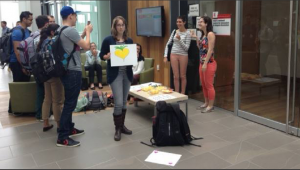“Have you seen that email?” said every other law student to every other law student, late last week. Iterations of these questions and comments evolved over the next 48 hours: Did you see the follow-up story? Did you hear that ______ picked up the story? [Insert one of the following: Above the Law, the Globe and Mail, the National Post, LSUC Twitter, the Osgoode Library Blog, or Legal Feeds, Huffington Post, Precedent Magazine as well as, various social media outlets as of the time of the writing of this article.]
You may be wondering, what does “crunchy pineapple” have to do with happiness? Not much at all, in fact. However, the “anonymous email” and poignant responses does provide fodder for commentary about how law students communicate (or don’t) with each other.
The original irritated author sent a very rude email to his or her entire class. Given that Administrative Law is a popular class, larger than most with its 72-student roster, chances are only a small subset of said students are snacking at any given time. Nevertheless, our irritated author felt safer in addresssing the whole class and to do so anonymously.
And I think that is really sad.
Let me qualify the word “sad.” I don’t mean to use “sad” as a synonym of pathetic, inadequate, or pitiful, as has been articulated by many of the peer responses to Snack Gate. In this context “sad” is a synonym for wholly unfortunate, regretful, and sorrowful. It is sad that somehow we have collectively created an atmosphere in law school, an atmosphere that all law schools are notorious for, that is alienating and isolating. Where did we go so wrong that one student felt he or she couldn’t turn to his neighbouring student and say: “Can you cool it on the crunchy carrots?” Alternatively, are classrooms becoming so stressful, and nerves so frayed that the crunch of carrots is so audibly irritable to another, to the extent that he or she felt compelled to take action?
Law school can be very lonely. Students receive mixed messages about the articling market, the steep competition, and the importance of sticking together as a profession and the need to reduce the Shark Tank stereotype. Yet, grades still reign supreme, intra-student sabotage goes uncombated (see Angie Sheep’s article this week), and the adversarial system becomes a way of life instead of a way of work.
Studies since the eighties continually report that at least 30 to 40 percent of law students suffer from depression or show some signs of developing depression. While law student applicants experience depression and related symptoms at the same statistical rate as their peers; by the end of first year, law students consistently demonstrate exacerbated and intensified symptoms. Osgoode, like other law schools, have made attempts to address mental health issues and provide staff support to students, which is commendable. Unfortunately, the chronic depression, feelings of isolation, stress, and competition suffered by our peers and our profession is much bigger than rudimentary counseling. It speaks to a much larger issue, a value system (or lack thereof), competing and conflicting messages by the industry, and the inter-dynamics between students at law school on a daily basis.
We learned on Day 1: in the adversarial system there can only be one winner, and by default the other party is the loser. In order to win, we use words to build up our own arguments and discredit the arguments of the opposing side. It is each lawyer’s responsibility to put his or her best argument forward, and it is our duty to take advantage of any substantial or technical error made by opposing counsel to better our own position. While this may have worked in medieval England (that’s up for argument), we have simultaneously been exposed to the follies and fallacies of such a system as a legal mechanism to resolve conflict. Taken out of the context of court, this value system becomes more problematic still. It encourages us to spare no one, to take advantage of every weakness, and expose every error.
Let me be perfectly clear, I am not making excuses for rude and obnoxious expression (while recognizing that people are free to express their opinions, and some mediums for expression are more appropriate than others). I am not belittling or trivializing the very valuable response that some students have had to the blatantly misinformed comments about “eating disorders” and the classist overtures of the offending email. The discussion that has been opened about eating disorders and classicism is an important and worthwhile conversation to have, but unfortunately this is only collateral to the story of the winners and the loser of Snack Gate.
This anonymous author made a mistake. He/she asked for courtesy in a discourteous manner. He/she called a fleshy fruit crunchy. He/she missed a period at the end of one of the paragraphs in his/her email. And the overall tone of the email was inappropriate, as well as an abuse of the intra-Osgoode email system. However, what does it say about us as a student body when we spare no one, take advantage of every weakness, and expose every error? What does it say that our primary response was mockery and ridicule, and our secondary response was a penned attack that directly discredits the character of the original author?
I guess it says, that we must be well-trained adversaries. I am just not convinced that is such a good thing, and it definitely is not making anyone any happier.
Full Disclaimer: The Obiter Dicta does not propagate or support any formal political position on pineapple and does not wish to make any official statement on the controversy of crunch. Having protected the collective from any fruit frenzied attack; I would like to declare that the foregoing is solely my personal opinion.

